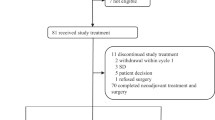Abstract
Iniparib is an investigational agent with antitumor activity of controversial mechanism of action. Two previous trials in advanced triple-negative breast cancer (TNBC) in combination with gemcitabine and carboplatin showed some evidence of efficacy that was not confirmed. This phase II randomized neoadjuvant study was designed to explore its activity and tolerability with weekly paclitaxel (PTX) as neoadjuvant treatment in TNBC patients. 141 patients with Stage II–IIIA TNBC were randomly assigned to receive PTX (80 mg/m2, d1; n = 47) alone or in combination with iniparib, either once-weekly (PWI) (11.2 mg/kg, d1; n = 46) or twice-weekly (PTI) (5.6 mg/kg, d1, 4; n = 48) for 12 weeks. Primary endpoint was pathologic complete response (pCR) in the breast. pCR rate was similar among the three arms (21, 22, and 19 % for PTX, PWI, and PTI, respectively). Secondary efficacy endpoints were comparable: pCR in breast and axilla (21, 17, and 19 %); best overall response in the breast (60, 61, and 63 %); and breast conservation rate (53, 54, and 50 %). Slightly more patients in the PTI arm presented grade 3/4 neutropenia (4, 0, and 10 %). Grade 1/2 (28, 22, and 29 %), but no grade 3/4 neuropathy, was observed. There were no differences in serious adverse events and treatment-emergent adverse events leading to treatment discontinuation among the three arms. Addition of iniparib to weekly PTX did not add relevant antitumor activity or toxicity. These results do not support further evaluation of the combination of iniparib at these doses plus paclitaxel in early TNBC.

Similar content being viewed by others
References
Cleere DW (2010) Triple-negative breast cancer: a clinical update. Commun Oncol 7:203–211. doi:10.1016/S1548-5315(11)70394-1
Cortazar P, Zhang L, Untch M et al (2014) Pathological complete response and long-term clinical benefit in breast cancer: the CTNeoBC pooled analysis. Lancet 384:164–172. doi:10.1016/S0140-6736(13)62422-8
Patel AG, De Lorenzo SB, Flatten KS et al (2012) Failure of iniparib to inhibit poly(ADP-Ribose) polymerase in vitro. Clin Cancer Res 18:1655–1662. doi:10.1158/1078-0432.CCR-11-2890
Liu X, Shi Y, Maag DX et al (2012) Iniparib nonselectively modifies cysteine-containing proteins in tumor cells and is not a bona fide PARP inhibitor. Clin Cancer Res 18:510–523. doi:10.1158/1078-0432.CCR-11-1973
O’Shaughnessy J, Osborne C, Pippen JE et al (2011) Iniparib plus chemotherapy in metastatic triple-negative breast cancer. N Engl J Med 364:205–214. doi:10.1056/NEJMoa1011418
O’Shaughnessy J, Schwartzberg L, Danso MA et al (2014) Phase III study of iniparib plus gemcitabine and carboplatin versus gemcitabine and carboplatin in patients with metastatic triple-negative breast cancer. J Clin Oncol 32:3840–3847. doi:10.1200/JCO.2014.55.2984
Ossovskaya V, Li L, Broude E et al (2009) Abstract #5552: BSI-201 enhances the activity of multiple classes of cytotoxic agents and irradiation in triple negative breast cancer. Cancer Res 69:5552
Patel AG, Sarkaria JN, Kaufmann SH (2011) Nonhomologous end joining drives poly(ADP-ribose) polymerase (PARP) inhibitor lethality in homologous recombination-deficient cells. Proc Natl Acad Sci USA 108:3406–3411. doi:10.1073/pnas.1013715108
Ossovskaya V, Wang Y, Budoff A et al (2011) Exploring molecular pathways of triple-negative breast cancer. Genes Cancer 2:870–879. doi:10.1177/1947601911432496
Esteva FJ, Franco SX, Hagan MK et al (2013) An open-label safety study of lapatinib plus trastuzumab plus paclitaxel in first-line HER2-positive metastatic breast cancer. Oncologist 18:661–666. doi:10.1634/theoncologist.2012-0129
Rugo HS, Campone M, Amadori D et al (2013) A randomized, phase II, three-arm study of two schedules of ixabepilone or paclitaxel plus bevacizumab as first-line therapy for metastatic breast cancer. Breast Cancer Res Treat 139:411–419. doi:10.1007/s10549-013-2552-8
Green MC, Buzdar AU, Smith T et al (2005) Weekly paclitaxel improves pathologic complete remission in operable breast cancer when compared with paclitaxel once every 3 weeks. J Clin Oncol 23:5983–5992. doi:10.1200/JCO.2005.06.232
Kelly CM, Green MC, Broglio K et al (2012) Phase III trial evaluating weekly paclitaxel versus docetaxel in combination with capecitabine in operable breast cancer. J Clin Oncol 30:930–935. doi:10.1200/JCO.2011.36.2079
U. S. Department of Health and Human Services, Center for Drug Evaluation and Research US (2014) Guidance for industry: pathologic complete response in neoadjuvant treatment of high-risk early-stage breast cancer—Use as an endpoint to support accelerated approval
Funding
This work was fully supported by Sanofi.
Author information
Authors and Affiliations
Corresponding author
Ethics declarations
Conflict of Interest
Employment: EJC (Sanofi), IGR (Sanofi); Remuneration: ALC (Roche, Lilly, Pfizer, Novartis), J. Balmaña (AstraZeneca), HR (Roche, Pierre Fabre, AstraZeneca), SGS (Roche, GlaxoSmithKline, Novartis, Teva, Eisai, Celgene); Stock ownership: ALC (MEDSIR ARO), EJC (Sanofi), IGR (Sanofi); Consultant/Advisory Role: ALC (Roche, AstraZeneca, Pfizer), CV (Bristol-Myers Squibb, GlaxoSmithKline, Roche, Novartis), SD (Novartis, Pfizer, Roche), J. Balmaña (AstraZeneca), SGS (AstraZeneca), JG (Novartis), NH (AstraZeneca); Funding: ALC (MEDSIR ARO, Celgene, Roche), SD (Novartis, Pfizer, Roche, Puma, Amgen, AstraZeneca), J. Balmaña (AstraZeneca, Pharmamar), HR (Roche, Amgen, Pierre Fabre), NH (Biomarin), NRR (Roche, Bristol-Myers Squibb, Janssen). All remaining authors have declared no conflicts of interest.
Ethical approval
All procedures performed in studies involving human participants were in accordance with the ethical standards of the institutional and/or national research committee and with the 1964 Helsinki declaration and its later amendments or comparable ethical standards.
Informed consent
Informed consent was obtained from all individual participants included in the study.
Additional information
Clinical trial number: This trial was registered in clinicaltrials.gov (NCT01204125).
Electronic supplementary material
Below is the link to the electronic supplementary material.
Rights and permissions
About this article
Cite this article
Llombart-Cussac, A., Bermejo, B., Villanueva, C. et al. SOLTI NeoPARP: a phase II randomized study of two schedules of iniparib plus paclitaxel versus paclitaxel alone as neoadjuvant therapy in patients with triple-negative breast cancer. Breast Cancer Res Treat 154, 351–357 (2015). https://doi.org/10.1007/s10549-015-3616-8
Received:
Accepted:
Published:
Issue Date:
DOI: https://doi.org/10.1007/s10549-015-3616-8




